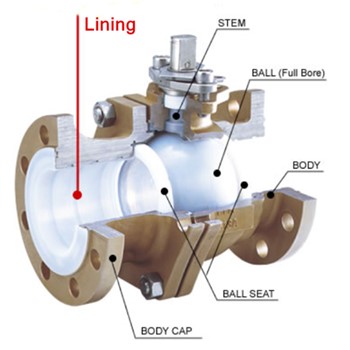PTFE lined valve VS PFA lined valves
Lined valves are a safe and reliable solution to any level of corrosion flow for chemical industrial. The lining of the valves and fittings ensures extremely high chemical resistance and longevity. PTFE lined valve and PFA lined valves are the commonly used valves that used as more economic alternatives to high-grade alloys in corrosive applications in the chemical, pharmaceutical, petrochemical, fertilizer, pulp and paper, and metallurgical industries. To know their difference, you must to know the material differences between PTFE and PFA.

Both of PFA and PTFE are the commonly used forms of Teflon. PFA and PTFE have similar chemical properties: excellent mechanical strength and stress-cracking resistance. The features of good molding performance and wide processing range made it’s suitable for molding, extrusion, injection, transfer molding and other molding processing, can be used for making wire and cable insulation sheath, high-frequency insulation parts, chemical pipelines, valves and pumps corrosion-resistant lining; Machinery industry with special spare parts, textile industry with a variety of anticorrosive materials electrode, and so on.
PTFE (Teflon) is a polymer compound formed by the polymerization of tetrafluoroethylene with excellent chemical stability, corrosion resistance, sealing, high lubrication and non-viscosity, electrical insulation and good aging resistance for media such as strong acid, strong alkali, strong oxidant. Its operating temperature is -200 ~ 180℃, poor fluidity, large thermal expansion. PTFE Lined valves ensures extremely high chemical resistance and longevity, can be widely used in corrosive applications in the chemical, electric machinery, pharmaceutical, petrochemical, fertilizer, pulp and paper, and metallurgical industries.
PFA (Polyfluoroalkoxy) is a high-performance thermoplastic material with improved viscosity developed from PTFE. PFA has similarly excellent performance as PTFE but superior to PTFE in terms of flexibility, which is the more popularly known form of Teflon. What distinguishes it from the PTFE resins is that PFA is melt processable. PFA has a melting point of about 580F and a density of 2.13-2.16 (g/cm3). Its service temperature is -250 ~ 260 ℃, it can be used for up to 10000h even at 210 ℃. It features excellent chemical resistance, resistance to any strong acid (including water), strong alkali, grease, insoluble in any solvent, excellent aging resistance, almost all viscous substances can not adhere to its surface, completely no combustion. Tensile strength (MPa) > 23, elongation (%) > 250.
In general, the combined performance of PFA lined valves is much better than PTFE lined valves. PTFE valve is more common and popular due to its cheaper cost, PFA is more often used in industrial applications, particularly industrial tubing and valves. PFA lined valve guarantees high sealing performance in the large range of pressure and temperature difference and is suitable for transportation of liquid and gas media in various industrial pipelines, such as sulfuric acid, hydrofluoric acid, hydrochloric acid, nitric acid and other highly corrosive media.
We offer the lined ball valve, plug valves and gate valves that are leak-free and have minimal operating and maintenance costs. In addition to the standard PTFE lining, we can also offer anti-static lining from PFA. If you’d like to find out more information, call us today!.



Leave a Reply
Want to join the discussion?Feel free to contribute!